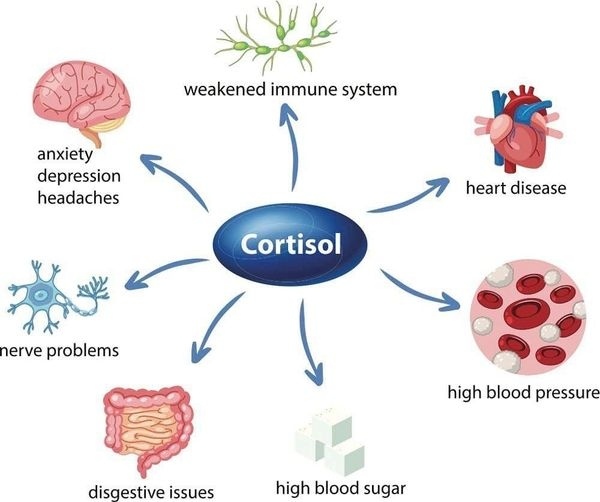4 min|Mia Harris
How to Lower Cortisol Levels and Improve Adrenal Function
Wellness, HormonesIt often gets a bad rap but we need to produce some cortisol in order to survive. Cortisol can make you feel more alert and motivated but it’s when cortisol is constantly being produced where the trouble begins.

Signs of High Cortisol Levels: depression, weight gain, weight loss, cravings for salt or sugar, insomnia, fatigue, brain fog, irritability, hormone imbalance such as PMS or PCOS.
Factors That Increase Stress on the Body: skipping meals, under eating at meals, over exercising, lack of sleep, environmental factors such as pollen or mold, or stress.
How Cortisol Impacts Hormone Health
When it comes to balancing hormones, regulating cortisol is one of the key foundations (something Mia covers extensively in her program ReNourish). Cortisol is produced by the adrenal glands when the brain perceives stress. When the adrenals are being constantly stimulated, it has a ripple affect on other hormones in the body.Stress burns through lots of nutrients like b vitamins, magnesium and vitamin c and uses up a lot of reserves needed to make other hormones. It can also convert hormones (like progesterone) into cortisol if needed. So whether you are struggling with PCOS, adrenal fatigue or menopause, you need to be nourishing those adrenal glands.
How to Manage Stress and Cortisol Levels Through Nutrition
Balance blood sugar levels. When blood sugar gets too low from not eating enough, going too long between meals or eating a primarily carbohydrate rich diet, it can trigger the release of cortisol. Cortisol and blood sugar are closely linked. You need to be prioritizing protein and balancing meals out with fibre and fat. Check out Mia's free blood sugar balancing guide here for more info on how to balance meals.Replenish B-vitamins. B-vitamins get quickly burned up in times of stress so it's important to include some complex carbs to keep energy levels up. You can find B-vitamins in whole grains such as quinoa and oatmeal.
Lower caffeine and alcohol intake. Avoid foods that increase stress on the body including sugar, excess caffeine and alcohol. Inflammation = increased cortisol levels.
Don’t be afraid of salt. The adrenal glands burn through lots of sodium in times of stress which is often why many people crave it. Try putting a pinch of pink Himalayan salt into water and use liberally on foods. Check out Mia's adrenal cocktail recipe for a nourishing drink that replenishes electrolytes.
Supplements to Lower Cortisol
B-Complex: B vitamins are among the first nutrients to get burned up in times of stress. B vitamins help to keep the nervous system healthy as well as help with energy metabolism.Vitamin C: Stress also depletes vitamin C. This nutrient is helpful for supporting mood, energy and immunity. Try adding in citrus fruits, berries and peppers or supplement with a quality vitamin c supplement.
Adaptogens: Adaptogens are roots and herbs that help the body to adapt to stress. Depending on which one you choose, they can help to lower anxiety, increase energy levels and boost stamina. Maca is one of my favourites along with ashwagandha, holy basil and rhodiola.
Takeaway
In today's competitive, modern world we encounter stress constantly. It can affect everything from moods and energy levels to recovery from workouts. It can be easy to manage as long as you give your body the right circumstances. Eat lots of whole foods, get enough sleep, exercise smarter not harder, and learn to incorporate stress management techniques throughout the day.
If you are looking for nutrition support dedicated to balancing hormones and reducing stress book a discovery call here with Registered Holistic Nutritionist, Mia Harris, to get started on your health journey today.
Related Articles

4 min|Dr. Alex Chan
EBOO for Chronic Inflammation: A Natural Approach for Systemic Relief
Regenerative Medicine, EBOO Therapy
4 min|Dr. Alex Chan
EBOO Therapy for Autoimmune Conditions: Exploring the Potential Benefits
Autoimmune Disease, Regenerative Medicine, EBOO Therapy


